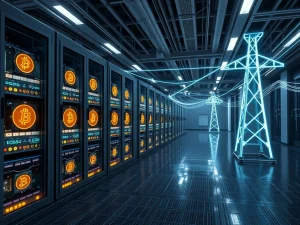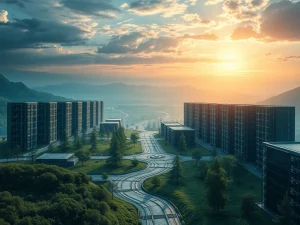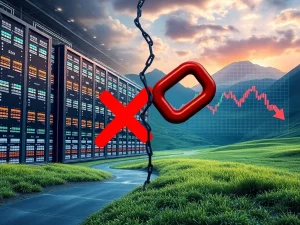Urgent: Texas Residents Sue MARA Holdings Over Alarming Bitcoin Mining Noise

Imagine living with a constant, low hum that vibrates through your home, disrupting your sleep, causing chronic headaches, and leaving you in a perpetual state of stress. For residents of Granbury, Texas, this isn’t a dystopian nightmare—it’s the daily reality, allegedly caused by a massive Bitcoin mining noise facility operated by MARA Holdings.
The cryptocurrency industry, known for its innovation and rapid growth, often operates at the cutting edge of technology. However, as this sector expands, its physical footprint and energy demands are increasingly clashing with local communities. This dramatic situation in Texas spotlights the growing tensions between industrial-scale crypto operations and the well-being of ordinary citizens.
The Alarming Reality of Bitcoin Mining Noise in Texas
Residents of Granbury, Texas, are at the forefront of a contentious battle against a substantial Bitcoin mining facility run by MARA Holdings. Located in an unincorporated area of Hood County, this 300-megawatt operation has become a source of significant distress due to the persistent and pervasive low-frequency noise it generates. This isn’t just typical background noise; it’s an incessant hum that permeates homes and lives.
In a compelling video produced by the nonprofit More Perfect Union, residents living within a mile of the site vividly describe their harrowing experiences. They report a litany of health issues directly attributed to the facility’s ceaseless operation:
- Chronic Headaches: A constant, throbbing pain that never seems to dissipate.
- Sleep Deprivation: The relentless hum makes it nearly impossible to achieve restful sleep, leading to fatigue and irritability.
- Stress-Related Illnesses: The ongoing disturbance contributes to heightened stress levels, impacting overall mental and physical health.
One elderly resident poignantly shared, “It never goes away, headaches never go away,” a statement made even more impactful as the facility’s disruptive hum was clearly audible in the background of the interview. This stark reality underscores the profound impact of industrial Bitcoin mining noise on daily life.
MARA Holdings Lawsuit: A Fight for Community Health
The frustration of the Granbury residents culminated in a significant legal action. In October 2024, a group of residents filed a lawsuit against MARA Holdings (formerly known as Marathon Digital). Their legal complaint accuses the company of exacerbating pre-existing health conditions and inflicting severe sensory and psychological harm through its operations. This MARA Holdings lawsuit is not just about noise; it’s about the fundamental right to peace and health within one’s own home.
The facility itself has a history: it was initially developed by Compute North before its bankruptcy in 2022. MARA acquired the site in January 2024, inheriting the existing infrastructure and, seemingly, the community’s concerns. This legal challenge highlights a critical point of friction: the rapid expansion of cryptocurrency infrastructure often occurs without adequate consideration for the local populations it affects.
Environmental lawyer Mandy DeRoche of Earthjustice weighed in on the unique nature of this particular form of pollution, noting that mining noise differs significantly from typical urban sounds like traffic. She emphasized its “incessant” low-frequency nature, which makes it particularly disruptive and difficult to escape. This constant, deep hum can penetrate walls and affect the human body in ways that higher-frequency sounds might not.
Understanding the Broader Crypto Mining Impact
The Granbury case is a microcosm of a larger issue facing the burgeoning cryptocurrency industry. Texas, with its attractive low energy costs and deregulated market, has become a magnet for large-scale mining operations. While this offers economic incentives for companies, it has also created significant challenges for residents. A major point of contention for the Granbury community is the perceived lack of regulatory oversight.
Residents argue that existing regulatory gaps in Texas have left them without adequate recourse to address the persistent noise and its health consequences. “It’s about corporate accountability,” stated a representative from a Texas environmental watchdog, underscoring the urgent need for robust safeguards and clearer guidelines for such industrial operations. The crypto mining impact extends beyond just energy consumption; it touches upon environmental justice and the social license to operate.
Despite repeated complaints and the filing of the lawsuit, MARA Holdings has not yet issued a public response to the allegations of negligence. This silence further complicates the situation for local leaders, who face an uphill battle in addressing the issue independently, often lacking the specific legal and regulatory tools needed to tackle such a novel form of industrial pollution.
Texas Bitcoin Mining and the Political Landscape
The dispute in Granbury has also gained political traction, adding another layer of complexity to the narrative surrounding Texas Bitcoin mining. Months before the lawsuit was filed, executives from MARA met with then-presidential candidate Donald Trump. Following this meeting, Trump publicly endorsed Bitcoin mining in his campaign promises, signaling a potential shift in federal policy and a generally pro-crypto stance.
This political alignment has left some residents feeling betrayed. One Granbury resident expressed profound regret over supporting Trump in the 2024 election, criticizing what they perceived as the “ignorance” of the administration toward the tangible community health impacts of such operations. While a Trump-led Congress has yet to pass specific mining legislation, recent bills addressing stablecoins and broader digital asset markets indicate a shifting regulatory landscape, suggesting that the industry is firmly on the federal radar.
This intersection of local grievances and national political endorsements highlights the complex challenges in balancing economic development, technological innovation, and public welfare. The case underscores how quickly localized environmental issues can escalate into broader political debates.
What Does This Mean for Community Health and Corporate Responsibility?
MARA’s financial strategy further complicates the narrative surrounding its operations. The company recently announced plans to issue $1 billion in convertible senior notes, partly to purchase additional Bitcoin. This move, leveraging its substantial holdings of 50,000 BTC (worth approximately $6 billion at the time of publication), aims to bolster its market position and expand its operational capacity. This financial maneuvering occurs simultaneously with the ongoing legal challenges and community outcry, presenting a stark contrast between corporate ambition and local distress.
Despite the significant controversy and the growing public scrutiny, Bitcoin’s price has remained largely unaffected by the Granbury dispute, currently hovering near $119,000. Analysts suggest that while local disputes may not directly impact broader market trends or the price of Bitcoin itself, they are crucial indicators of the industry’s increasing social and environmental scrutiny. “The industry’s expansion must include dialogue with affected communities,” one expert stated, warning that neglecting public concerns could undermine the long-term legitimacy and sustainability of crypto mining operations.
Residents continue to demand stricter noise ordinances and comprehensive environmental impact assessments to prevent similar situations from arising elsewhere. Advocates are increasingly calling for federal intervention to address the existing gaps in oversight, arguing that state-level regulations are insufficient to manage the scale and impact of modern industrial crypto mining. The case in Granbury serves as a powerful cautionary example of the inherent trade-offs in cryptocurrency’s rapid expansion, where economic incentives too often overshadow the critical aspects of community health and well-being. As this debate unfolds, the outcome could significantly influence how regulators across the U.S. approach the delicate balance between fostering technological innovation and safeguarding public health priorities.
Frequently Asked Questions (FAQs)
1. What is the core issue in the Granbury, Texas lawsuit against MARA Holdings?
The core issue is a lawsuit filed by Granbury residents against MARA Holdings, alleging severe health impacts, including chronic headaches, sleep deprivation, and stress-related illnesses, caused by persistent low-frequency noise pollution from the company’s 300-megawatt Bitcoin mining facility.
2. What specific health impacts are residents reporting due to the Bitcoin mining facility?
Residents living near the facility report experiencing chronic headaches, significant sleep deprivation, and various stress-related illnesses. They describe the noise as an incessant, low-frequency hum that never goes away and profoundly disrupts their daily lives.
3. Why is Texas a popular location for Bitcoin mining operations?
Texas attracts Bitcoin mining operations primarily due to its low energy costs and deregulated energy market, which provide an economically favorable environment for energy-intensive activities like cryptocurrency mining.
4. How has MARA Holdings responded to the allegations and lawsuit?
As of the time of the article, MARA Holdings has not publicly responded to the allegations of negligence or the lawsuit filed by the Granbury residents, despite repeated complaints.
5. Does this lawsuit affect Bitcoin’s market price?
According to analysts, local disputes like the Granbury lawsuit typically do not directly impact broader market trends or the price of Bitcoin. While the controversy highlights growing scrutiny on the industry, Bitcoin’s price has remained largely unaffected by this specific case.
6. What are residents and advocates demanding as a resolution?
Residents and advocates are demanding stricter noise ordinances, comprehensive environmental impact assessments for mining facilities, and federal intervention to address regulatory gaps in oversight, emphasizing the need for corporate accountability and protection of community health.









